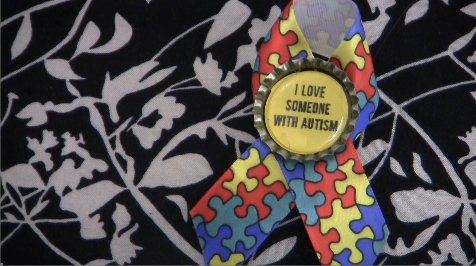Khalil's Story




 id="OptLeadPhoto" />
id="OptLeadPhoto" />
 id="OptLeadPhoto" />
id="OptLeadPhoto" />
Sheryl McKay’s son couldn’t speak until he was 4 years old. He wore pull-ups until he was four and a half, and could not make eye contact with people until much later. As a 12 year old, Khalil McKay attends science camps, school, and plays in weekly basketball tournaments. When Khalil speaks, the telltale signs of autism are almost invisible.
“My mom does a lot of things for me and I am grateful and happy that she’s always with me, she’s on my—she’s on my side,” stammers Khalil.
McKay has spent the last eight weeks learning about her son’s rights and responsibilities as a child who has autism. McKay attended a camp hosted by The Special Needs Network, which helps families in South Los Angeles to advocate for their children’s rights.
“I wanted more information about autism and how I could best help my son, said McKay. He was diagnosed when he was two years old. It was really hard when we found out, but with God’s help we overcame”.
Areva Martin founded the Special Needs Network when her son was also diagnosed with autism and because, “there was no parent group in South L.A. that focused on advocating for their children’s rights”. Martin also says parents in South L.A. are at a disadvantage when it comes to resources and education for their children who have autism.
Martin is not alone in her concerns. Musicians, lawyers, and organization have hosted a range of events across southern California this past month that stem from a growing focus on mental health issues, mental health rights, and autism awareness. The Didi Hirsch Organization is a mental health services center. This past month they hosted an Erasing the Stigma awards show that showcased musicians and entertainers who have drawn attention to mental health issues.
Model and actress, Garcelle Beauvais hosted the event.
“I think it’s all about being aware. I think having a conversation with kids. I think its having conversations in schools and making kids as well as the educators aware that mental illness is something that can be helped,” said Beauvais.
The Public Counsel in Los Angeles is trying a different approach to help those with mental illness.
This past January class action suit a was filed against the Eastern Los Angeles Regional Center. The Public Counsel, Dunn & Crutcher LLP alleged that the center “unlawfully terminated the most effective treatment for their [children with autism] condition”. The treatment is known as DIR or Developmental, Individual and Relationship based-treatment. The treatment creates a bond between the child and their parent as well the child’s doctor and the child. The counsel argues that children who have autism will suffer without financial support for the program.
The Special Needs Network itself is attempting to enact legislation that will protect children and families dealing with autism. The Network is sponsoring a legislative package written by Senator Curren Price and Senate President Tom Darrel. The package was presented to the State capitol in Sacramento this past month and emphasizes extending private insurance coverage of autism therapies and holds state agencies accountable for the autism services they are supposed to provide.
The Department of Developmental Services in California states that support for children who are autistic stems from “a combination of federal, state, county and local government services, private businesses, support groups and volunteers.”
An LA Times article reported a four part series on autism. In its findings, it states that “the state Department of Developmental Services last year spent an average of $11,723 per child on whites, compared with $11,063 on Asians, $7,634 on Latinos and $6,593 on blacks.”
Sheryl McKay is troubled by those statistics.
“There are not enough resources in this community for my son, especially when compared to places like Pasadena,” says McKay.
McKay attended classes hosted by the Special Needs Network that taught her how advocate for her son in front of legislators and about her son’s rights in school.
“It’s very informative. Because I learned a lot of stuff I didn’t know, said McKay. Now I know how to really go out there and really be a good advocate for my child now.“
McKay’s son was diagnosed with autism when he was 2 ½ years old. When he was old enough to attend kindergarten, McKay received news that changed her life.
“When he was at school they really didn’t think he was going to make it through kindergarten and I was like oh no,” said McKay.
She began visiting regional centers that help parents and children living with autism and volunteering at her son’s school regularly. McKay attended classes with her son to learn exactly how to teach her son so he would not fall behind in school and hired speech, behavioral, and social therapists. “Things were very difficult. His social skills were not good. When he would get angry, he would take off all of his clothes and go in his room. I had to bring the behavioral therapist to the house to work with him,” said McKay. McKay later discovered that her son Khalil needed surgery to put tubes in his ears, remove his adenoids, and correct his sleep apnea. “My son could not hear. If they [children with autism] cannot hear, they cannot speak. That’s a major thing. I always tell parents to test their kids hearing. Khalil started speaking after the surgery,” said McKay.Khalil McKay now visits his former schools where the kids know him and his mother by first name. Khalil leaves his mother’s side to go play basketball with some of the younger kids and is quick to correct the other’s kid’s form when they shoot hoops. When it’s time for Sheryl McKay to drive and pick up her other two children, she calls Khalil who very clearly articulates that he is not ready to leave.
McKay laughs and yells, “Boy don’t you tell me one minute, come now!”
Khalil’s eyes glint with mischief as he catches up to his mother. He pauses for a moment and says,
“She always cheers me up when I am sad or angry. I really appreciate her.”
Khalil wraps his arm around his mother and they walk away side by side.